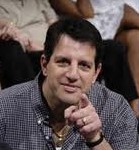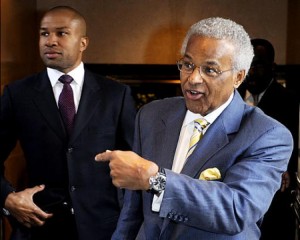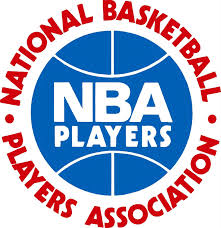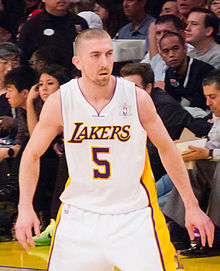 I will not be the next Executive Director of the players union.
I will not be the next Executive Director of the players union.
I got word of my rejection via e-mail, with no further explanation, so I decided to use my column this week to describe what is going on during the selection process, and what a shame it is.
NBA players and all athletes in general have a pretty miserable track record at many things. Outside of actually playing basketball or another sport, their skills don’t necessarily translate into being successful in other areas.
Their lack of financial success has been well documented, as well as the high divorce rate, among other player related issues. As we dig deeper into the mechanisms that exist in players’ lives, these results aren’t surprising and are actually pretty predictable.
As a former Executive Director and Board Executive for the NBA’s Retired Players Association I have worked closely with many players on the other end of their playing careers. More importantly as a long time player, I have lived through the many bumps and bruises myself.
I am a player’s guy who detests the way players are constantly being taken advantage of. I believe that a different type of education needs to happen, empowering players to take more control of their own outcomes.
 Currently the National Basketball Players Association is searching for a new Executive Director to replace their last one, Billy Hunter, who was forced out in disgrace. He was charged with being secretive, manipulative, and putting his own agenda before the players.
Currently the National Basketball Players Association is searching for a new Executive Director to replace their last one, Billy Hunter, who was forced out in disgrace. He was charged with being secretive, manipulative, and putting his own agenda before the players.
I recently became part of the process as a candidate for the job. I found the process to be secretive, manipulative, and full of conflicting agendas fighting for control. Not surprising given the history of the NBPA and players in general. Pro athletes are among the most manipulated of all employees.
Here’s why:
• Athletes, like entertainers, have the biggest disconnect between how much they earn and what they know about money and finance. They are paid like CEOs of billion dollar companies without having a clue about money.
• They are trained from childhood to be coached and managed. They grow up being surrounded by folks telling them what to do and where to go. Their world is sports, and it is consuming mentally and physically, leaving room for little else.
• Once in the pros they are represented by agents who tell them “just play, I’ll take care of everything else”! They have financial dealings with dozens of people who’s job it is to separate them from their money. Like Elvis, they become surrounded by “friends” and advisors who have no incentive to help them become educated.
• The less athletes know, the easier it is to “manage” them. That’s code for CONTROL, the key to player representation. Player “management” is the golden ticket to the money train. Billions of dollars are at stake.
• They are forced to rely on professional advisors in areas that they know nothing about. Many players are totally dependent on their advisors with no real way to understand them.
• Varied agendas are held by the agents, the teams, the league, the posses, the families, and numerous other entities. The turf wars are a thing of beauty.
• Players are forced to operate in areas that are totally foreign to them. They might as well be reading Chinese.
As a union, the players establish an Executive Committee of players to run their business. Each team elects a player representative to represent that team’s wishes. They in turn hire a professional staff, including an Executive Director, to handle the day-to-day business operations. In theory, the Executive Committee of players holds the power and the Executive Director carries out their directives.
 In practice, the players don’t have the first clue on how to legally run a union, deal with negotiating billion dollar contracts, or handle the myriad of legal issues that come up. How could they? They are the equivalent of workers fresh out of high school or may have a little college. There is no way that athletes have a chance to successfully manage their advisors without additional advisors.
In practice, the players don’t have the first clue on how to legally run a union, deal with negotiating billion dollar contracts, or handle the myriad of legal issues that come up. How could they? They are the equivalent of workers fresh out of high school or may have a little college. There is no way that athletes have a chance to successfully manage their advisors without additional advisors.
So now the NBPA is trying to hire a new Executive Director.
The process is that the Executive Committee hired a search firm to manage the interview process. The search firm does a job description and sets out to identify candidates. The candidates get interviewed by the committee of players who recommend the best ones for a final vote, which is done by the nine committee members and the 30 team player representatives. Sounds like a reasonable system, right?
So now the games begin:
The process in real life is so loaded with inefficiency and secrecy that it seems like it is being purposefully manipulated. Lets take a look:
• The actual search process started very close to the beginning of training camp. This timing guarantees that the players are at their most unavailable for the next 8 months. The advisors have virtual free reign over the process. By the way, there is no real reason that the hiring couldn’t be put off until the summer when the players have full availability.
• The initial “cuts” were made with little player involvement. After all, which player has time to go through a few hundred resumes? As a matter of fact, it is my understanding that virtually all former players, regardless of qualifications, were eliminated at this stage without so much as a single courtesy interview. In my case, my resume matched the job requirements exactly, my name was advanced by a top executive within the Association, and I was still eliminated. There was so much complaining that a small group of players, including myself, were reinstated.
• As the season is in full swing, it is difficult to get more than 3 players in the same location for interviews. Just the initial interview process should take months to be done thoroughly. Insider reports indicate that the search firm was pushing for final interviews when many candidates (including myself) had not been met with yet.
• I finally got an initial interview opportunity in early January. I flew out to meet with Board President Chris Paul, Steve Blake, and Willie Green in Los Angeles.
 When I get there I was informed that Green was unavailable and Paul had a rehab appointment and needed to meet earlier (he had just injured his shoulder). So I ended up doing individual interviews with both Chris and Steve. I met with each for an hour with a representative from the search firm and Chris’ business manager in the room. In Chris’ case, he was pretty distracted by his injury and the anguish of being injured. Still I felt that the interview went pretty well. I had produced a full vision plan thoroughly discussing my history in the league and extensive experience at every level of player involvement. After all, I had been a player rep for years, CBA negotiator, ran the Retired Players Association and had a lifelong connection to the league. I also forwarded a couple chapters from my upcoming book on why players struggle making their life transitions after their careers end. (The chapter titled “How to go Broke on $100 million” should be required reading.)
When I get there I was informed that Green was unavailable and Paul had a rehab appointment and needed to meet earlier (he had just injured his shoulder). So I ended up doing individual interviews with both Chris and Steve. I met with each for an hour with a representative from the search firm and Chris’ business manager in the room. In Chris’ case, he was pretty distracted by his injury and the anguish of being injured. Still I felt that the interview went pretty well. I had produced a full vision plan thoroughly discussing my history in the league and extensive experience at every level of player involvement. After all, I had been a player rep for years, CBA negotiator, ran the Retired Players Association and had a lifelong connection to the league. I also forwarded a couple chapters from my upcoming book on why players struggle making their life transitions after their careers end. (The chapter titled “How to go Broke on $100 million” should be required reading.)
 When I met later with Blake, I was a little dismayed that he had not read any of the material that I submitted. It showed that either he was not fully prepared or I was not being taken seriously. Still we did the interview and again, I thought that it went as well as it could. In both of their defense, they were dealing with injuries while trying to manage these interviews that were being done on the fly. Again, this is what you get when the process is done during the season — distracted players.
When I met later with Blake, I was a little dismayed that he had not read any of the material that I submitted. It showed that either he was not fully prepared or I was not being taken seriously. Still we did the interview and again, I thought that it went as well as it could. In both of their defense, they were dealing with injuries while trying to manage these interviews that were being done on the fly. Again, this is what you get when the process is done during the season — distracted players.
When I left both interviews the search firm rep seemed impressed with my presentations. He informed me that I would be hearing about the other interviews. He said that since the players are scattered, I would need to travel to five more cities to meet with the rest of the committee 1 or 2 at a time. Luckily I am in control of my own schedule, or this would be impossible to manage.
Plus I can’t help but wonder how these players can effectively compare the candidates this way (of course they can’t, that’s part of the control).
Since I travel as a radio analyst, I sent my schedule to the search guy hoping to streamline the interviews. After no response for two weeks, I was understandably confused by it all. Then I finally get an e-mail notifying me that I was no longer being considered for the position. No phone call, no explanation, nothing. Considering my history with the union and the league, I felt that it was pretty unprofessional and bush league.
How is it possible that a candidate is told he will be interviewed by the other committee members, then gets eliminated after only meeting with two of the nine members? It’s not as if the meetings were disasters. Even if those two guys weren’t crazy about me, what if six of the others were? How can two people decide that?
I heard about another candidate who flew to Washington, D.C. for his interview and it was cancelled by a storm. He was eliminated before it could be rescheduled. He was never interviewed at all.
I played in the league for 18 years and have been in the Retired Association for another 12. For someone with my experience, it is easy to see the signs of the manipulations. I have experienced and seen it from all levels between the agents, advisors, league, and on and on.
Maybe that’s one of the reasons that I was eliminated.
Plus chew on this: Somehow, 39 players have to vote on candidates for a massively important job. How can this be done effectively by the players when no more than five or six players have ever even talked to them? Certainly the 30 player reps will have to vote blindly. There is even been talk of trying to vote this weekend at the All-Star Game. It seems impossible that the players can control the process the way it is being done.
Maybe that’s the point.
Danny Schayes is a retired 18-year-veteran of the NBA, a professional broadcaster and soon-to-be-published author now penning NBA columns for SheridanHoops. Follow him on Twitter.
MORE FROM DANNY SCHAYES:
IN THE NBA, SOMETIMES YOU CAN GO HOME AGAIN
ARE TODAY’S GREAT SCORERS BETTER?
WHEN STARS GET HURT, IT’S BAD FOR THE LEAGUE
PARDON ME, BUT INDIANA-MIAMI MEANT NEXT TO NOTHING
WHAT IT’S REALLY LIKE TO BE TRADED
HAZING: IT’S A LOCKER ROOM, NOT AN ENCOUNTER GROUP
A STATEMENT ON “STATEMENT GAMES”
WHY PRESEASON TRIPS, NEAR AND FAR, CAN BE ONEROUS
THE NEW ANALYTICS: FOOL’S GOLD?
10 PREDICTIONS FOR THE 2013-14 SEASON
WHEN ROOKIE HAZING WENT UNDERGROUND
CAN CHRIS PAUL LEAD THE NBPA BACK FROM THE DEAD?
ADAM SILVER NEEDS TO EMBRACE THE NBA’S LIVING PIONEERS
THE FRANCHISE PLAYER IS AN ENDANGERED SPECIES
WHY THE CHAMPIONSHIP FORMULA ALWAYS WORKS (UNTIL IT DOESN’T)
HOW DO HEAT COMPARE TO GREATEST TEAMS EVER?
I am neither a candidate nor a player, but I am an interested observer. I can only say that the executive committee is being guided by a search firm and a law firm with their own agenda who are not looking after the player’s best interest.
The process is tainted and the only way it can be cleansed is by removing the search firm and starting the process over from the beginning.
I’m writing anonymously, but I was also a candidate for this position. I’m not a former player but I’m a seasoned executive with extensive experience negotiating with the NBA. I was also rejected after meeting with only two players on the executive committee. My meeting only lasted 20 minutes and it was late at night so both players were clearly distracted. I did at least get a phone call telling me I was rejected.
The whole process is a total mess and they will get exactly what they deserve — more chaos.